

The Homebrew Industrial Revolution: A Low-Overhead Manifesto: Kevin A. Carson: 9781439266991: Amazon.com: Books. Coffee FAQ. General questions and answers about our campaign.
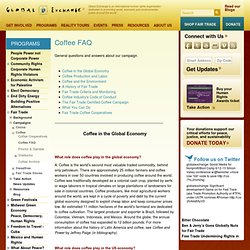
Coffee in the Global Economy What role does coffee play in the global economy? A: Coffee is the world's second most valuable traded commodity, behind only petroleum. There are approximately 25 million farmers and coffee workers in over 50 countries involved in producing coffee around the world. Coffee was traditionally developed as a colonial cash crop, planted by serfs or wage laborers in tropical climates on large plantations of landowners for sale in colonial countries. What role does coffee play in the US economy? A: Coffee is the US's largest food import and second most valuable commodity only after oil.
How are coffee prices currently set? A: Coffee prices are set according to the New York "C" Contract market. Specialty coffee is often imported at a negotiated price over the C market, which is considered a 'quality premium'. Environmental psychology. Environmental psychology is an interdisciplinary field focused on the interplay between humans and their surroundings. The field defines the term environment broadly, encompassing natural environments, social settings, built environments, learning environments, and informational environments. Since its conception, the field has been committed to the development of a discipline that is both value oriented and problem oriented, prioritizing research aimed at solving complex environmental problems in the pursuit of individual well-being within a larger society.[1] When solving problems involving human-environment interactions, whether global or local, one must have a model of human nature that predicts the environmental conditions under which humans will behave.
This model help can design, manage, protect and/or restore environments that enhance reasonable behavior, predict the likely outcomes when these conditions are not met, and diagnose problem situations. History[edit] Concepts[edit] Permaculture. With its system of applied education, research and citizen- led design permaculture has grown a popular web of global networks and developed into a global social movement[citation needed].
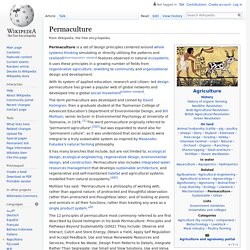
The term permaculture was developed and coined by David Holmgren, then a graduate student at the Tasmanian College of Advanced Education's Department of Environmental Design, and Bill Mollison, senior lecturer in Environmental Psychology at University of Tasmania, in 1978. [1] The word permaculture originally referred to "permanent agriculture",[3] but was expanded to stand also for "permanent culture", as it was understood that social aspects were integral to a truly sustainable system as inspired by Masanobu Fukuoka’s natural farming philosophy. Deep ecology. Deep ecology is a contemporary ecological and environmental philosophy characterized by its advocacy of the inherent worth of living beings regardless of their instrumental utility to human needs, and advocacy for a radical restructuring of modern human societies in accordance with such ideas.
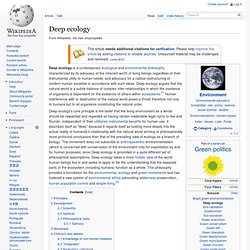
Deep ecology argues that the natural world is a subtle balance of complex inter-relationships in which the existence of organisms is dependent on the existence of others within ecosystems.[1] Human interference with or destruction of the natural world poses a threat therefore not only to humans but to all organisms constituting the natural order. Deep ecology's core principle is the belief that the living environment as a whole should be respected and regarded as having certain inalienable legal rights to live and flourish, independent of their utilitarian instrumental benefits for human use. Principles[edit] These principles can be refined down into three simple propositions: Social ecology. Social ecology is a critical social theory founded by Green author and activist Murray Bookchin.
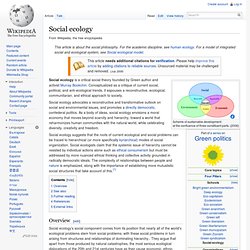
Agroecology. Agroecology is the study of ecological processes that operate in agricultural production systems.
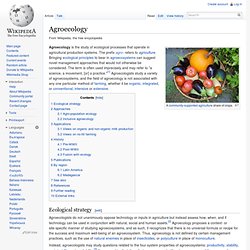
The prefix agro- refers to agriculture. Bringing ecological principles to bear in agroecosystems can suggest novel management approaches that would not otherwise be considered. The term is often used imprecisely and may refer to "a science, a movement, [or] a practice. Political ecology. Political ecology studies the complex interaction between economics, politics, technology, social tradition and the biological environment.
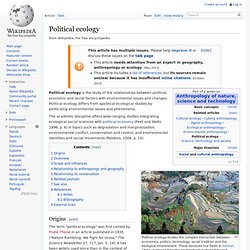
These terraced rice fields in Yunnan, China, evidence how the environment is shaped by and shapes economy and society. Political ecology is the study of the relationships between political, economic and social factors with environmental issues and changes. Political ecology differs from apolitical ecological studies by politicizing environmental issues and phenomena. Political ecology. Human ecology. Human ecology is an interdisciplinary and transdisciplinary study of the relationship between humans and their natural, social, and built environments.
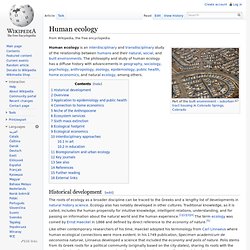
The philosophy and study of human ecology has a diffuse history with advancements in geography, sociology, psychology, anthropology, zoology, epidemiology, public health, home economics, and natural ecology, among others. Historical development[edit] The roots of ecology as a broader discipline can be traced to the Greeks and a lengthy list of developments in natural history science. Ecology also has notably developed in other cultures. Sustainable development. While the modern concept of sustainable development is derived mostly from the 1987 Brundtland Report, it is also rooted in earlier ideas about sustainable forest management and twentieth century environmental concerns.
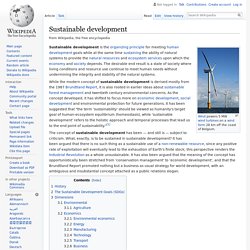
As the concept developed, it has shifted to focus more on economic development, social development and environmental protection for future generations. It has been suggested that "the term 'sustainability' should be viewed as humanity's target goal of human-ecosystem equilibrium (homeostasis), while 'sustainable development' refers to the holistic approach and temporal processes that lead us to the end point of sustainability. "[1] The concept of sustainable development has been — and still is — subject to criticism. Risk. Risk is the potential of losing something of value, weighed against the potential to gain something of value.
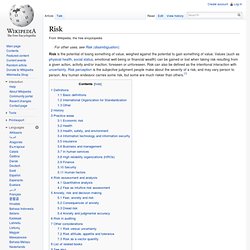
Values (such as physical health, social status, emotional well being or financial wealth) can be gained or lost when taking risk resulting from a given action, activity and/or inaction, foreseen or unforeseen. Risk can also be defined as the intentional interaction with uncertainty. Risk perception is the subjective judgment people make about the severity of a risk, and may vary person to person. Any human endeavor carries some risk, but some are much riskier than others.[1] Definitions[edit] Firefighters at work Risk can be defined in a variety of ways.
Basic definitions[edit]
2. 1. Environmental ethics. Environmental ethics is the part of environmental philosophy which considers extending the traditional boundaries of ethics from solely including humans to including the non-human world.
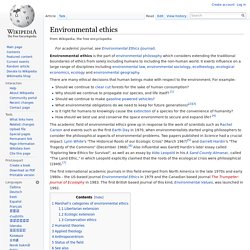
It exerts influence on a large range of disciplines including environmental law, environmental sociology, ecotheology, ecological economics, ecology and environmental geography. There are many ethical decisions that human beings make with respect to the environment. For example: Should we continue to clear cut forests for the sake of human consumption? Why should we continue to propagate our species, and life itself? The academic field of environmental ethics grew up in response to the work of scientists such as Rachel Carson and events such as the first Earth Day in 1970, when environmentalists started urging philosophers to consider the philosophical aspects of environmental problems. Marshall's categories of environmental ethics[edit] Libertarian extension[edit] Ecologic extension[edit]
Sustainability standards and certification. The term “sustainability standards” refers to a voluntary, usually third party-assessed, norms and standards relating to environmental, social, ethical and food safety issues, adopted by companies to demonstrate the performance of their organizations or products in specific areas. There are perhaps up to 500 such standards and the pace of introduction has increased in the last decade. Organic certification. The National Organic Program (run by the USDA) is in charge of the legal definition of organic in the United States and also performs organic certification. Organic vegetables at a farmers' market in Argentina Organic certification is a certification process for producers of organic food and other organic agricultural products. Environmental ethics. Urban planning. Urban planning designs settlements, from the smallest towns to the largest cities.
Shown here is Hong Kong from Western District overlooking Kowloon, across Victoria Harbour. Urban planning (urban, city, and town planning) is a technical and political process concerned with the use of land and design of the urban environment, including transportation networks, to guide and ensure the orderly development of settlements and communities.
It concerns itself with research and analysis, strategic thinking, architecture, urban design, public consultation, policy recommendations, implementation and management.[1] Regional planning. Regional planning deals with the efficient placement of land-use activities, infrastructure, and settlement growth across a larger area of land than an individual city or town. The related field of urban planning deals with the specific issues of city planning. Both concepts are encapsulated in spatial planning. Nomenclature[edit] Although the term "regional planning" is nearly universal in English-speaking countries the areas covered and specific administrative set ups vary widely. Environmental design. Environmental impact assessment. Environmental Impact Assessment is a formal process used to predict the environmental consequences (positive or negative) of a plan, policy, program, or project prior the implementation decision, it proposes measures to adjust impacts to acceptable levels or to investigate new technological solution.
Although it can lead to difficult economic decisions, strong political and social commitments, but it protects environment which sounds basis for effective and sustainable development.[1] Market-based environmental policy instruments. Porter hypothesis. According to the Porter hypothesis, strict environmental regulations can induce efficiency and encourage innovations that help improve commercial competitiveness. The hypothesis was formulated by the economist Michael Porter in an article in 1995.
Kuznets curve. Hypothetical Kuznets curve. Empirically observed curves aren't smooth or symmetrical—see reference[1] for examples of "real" curves. Environmental governance. Sustainable architecture. Pollution haven hypothesis. Factory with smokestacks overlooking the Yangtze River The pollution haven hypothesis posits that, when large industrialized nations seek to set up factories or offices abroad, they will often look for the cheapest option in terms of resources and labor that offers the land and material access they require.[1] However, this often comes at the cost of environmentally sound practices.
Developing nations with cheap resources and labor tend to have less stringent environmental regulations, and conversely, nations with stricter environmental regulations become more expensive for companies as a result of the costs associated with meeting these standards. Thus, companies that choose to physically invest in foreign countries tend to (re)locate to the countries with the lowest environmental standards or weakest enforcement. Environmental impact assessment. Environmental policy. Definition[edit] It is useful to consider that environmental policy comprises two major terms: environment and policy. Environmental planning. Land-use planning. Landscape planning. Spatial planning. Urban planning.